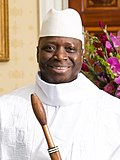| |||||||||||||||||||||
| Registered | 509,301 | ||||||||||||||||||||
|---|---|---|---|---|---|---|---|---|---|---|---|---|---|---|---|---|---|---|---|---|---|
| |||||||||||||||||||||
 Results by region | |||||||||||||||||||||
| |||||||||||||||||||||
 |
|---|
Presidential elections were held in the Gambia on 18 October 2001. The result was a victory for the incumbent Yahya Jammeh, who received just over 50% of the vote.
Contents
The elections were marred by irregularities and repression of the opposition; [1] Pre-election violence resulted in the death of an unarmed opposition supporter who was shot by a police officer, [2] and several injuries. [3] The government also expelled a British diplomat who had attended an opposition rally. [4]


